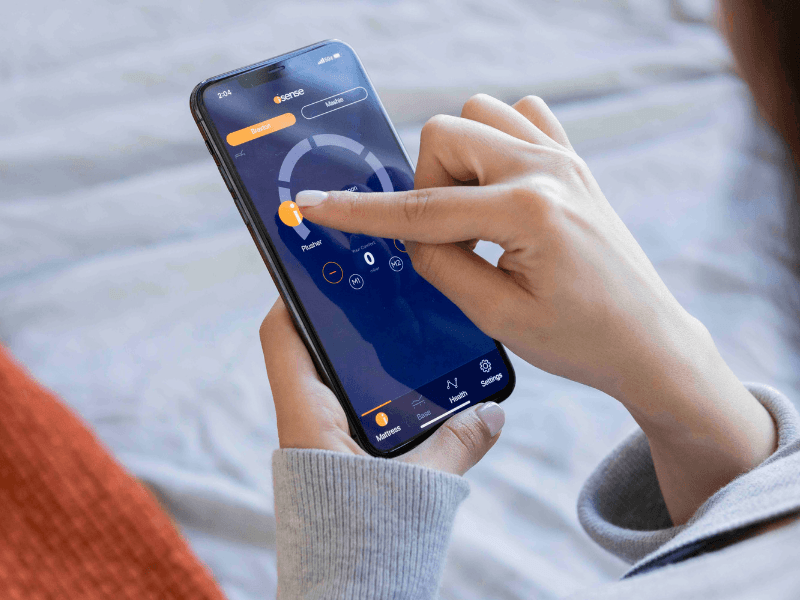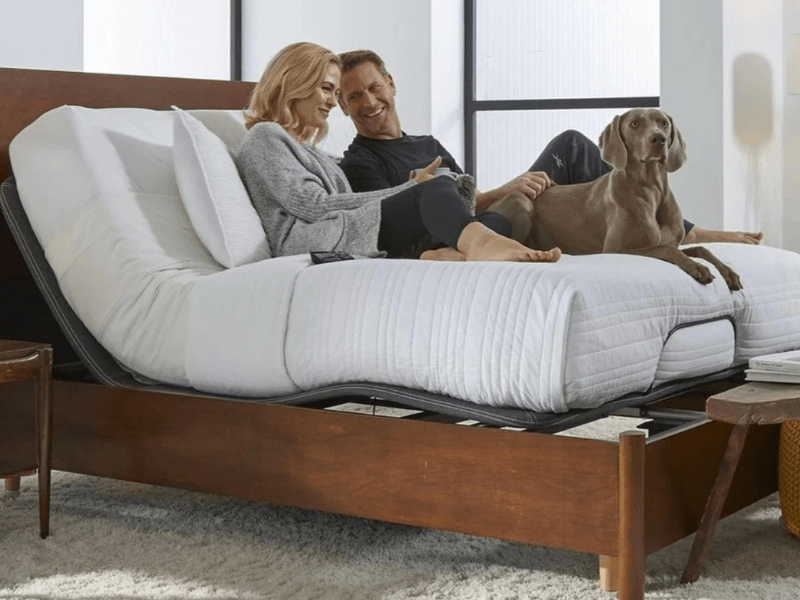Got back pain? You might be trying to figure out if a plush mattress or a firm mattress is the better bet to provide you with a good night's rest. Well, you're not alone. Many people struggle with back pain, and the mattress you choose plays a key role in relieving (or prolonging) the pressure. You could purchase an expensive mattress only to find out it isn't as comfortable for your back as you anticipated. You might end up having to continue to seek a remedy for your back pain. To prevent this from happening, it's important to do your research (and take advantage of at-home, risk-free trials!) before selecting your mattress.
In this blog post, we'll look at the differences between plush and firm mattresses, explore the pros and cons of each, and make an argument for which one is best for those who suffer from back pain. Additionally, we'll answer some frequently asked questions about back pain, mattresses, and other tips for improving your sleep. By the time you're done, you should have a better understanding of which mattress is right for you. So, let's get started!
Quick Summary
Generally, the best mattress for back pain relief is an adjustable firmness mattress that provides pressure relief and comfort at every setting. If you have chronic lower back pain, memory foam, hybrid or latex mattresses can also be recommended as these provide more contouring support than traditional innerspring mattresses.
Firm vs. Plush Mattress for Back Pain
When trying to find the best mattress for relieving and managing back pain, comparing firm and plush mattresses is a great place to start. Both types of mattresses offer benefits for those with chronic or periodic back pain so it's important to understand the differences between these two types when choosing one that's right for you.
The main difference between firm and plush mattresses is their level of cushioning. Firm mattresses are designed to provide extra support and spinal alignment while plush mattresses have a softer surface that can help relieve pressure points. While either type of mattress may be suitable for individuals dealing with back pain, some may not experience relief with a specific type. It is advisable to try out both types before deciding on which one to purchase.
Firm mattresses can provide support which may help alleviate back pain by supporting the spine's natural curvature and properly aligning it during sleep. This type of support helps reduce strain on the lower back and reduces discomfort during the night. Additionally, firm mattresses tend to have fewer sink spots than softer ones which can be beneficial in helping maintain alignment throughout sleep. Whether a mattress sags over time, though, depends upon the construction of the mattress.
Plush mattresses, on the other hand, offer more cushioning than firmer models which can also be beneficial for relieving pressure points and joint pain. A plush mattress helps create a cradle-like feeling that can help minimize tossing and turning during sleep, leading to more restful nights without painful disruptions. The additional cushioning provided by this type of mattress can also help prevent moisture buildup around pressure points reducing irritation for those dealing with chronic or periodic back pain.
Given the differences between the two types of mattresses, there are distinct advantages to each when looking for a solution to relieve or manage chronic or occasional back pain. The next section will discuss the advantages of a firm mattress and how they can specifically benefit those dealing with constant or occasional back pain symptoms.
Advantages of a Firm Mattress
A firm mattress is often recommended as the one of the best standard-firmness options to alleviate or prevent back pain. It provides good support, which prevents sinking into the bed and ensures that your spine is kept in alignment during sleep. This type of mattress also offers numerous advantages, such as:
1) Increased Stability - Firm mattresses can provide better motion isolation when one person moves on one side of the bed. Effective motion isolation means that the other person won't feel the movement. They also maintain their shape over time and often last longer than their plush counterparts. This depends entirely on the construction of the mattress, however, and the quality of the materials used.
2) Pressure Point Relief - The conforming support of a firm mattress helps even out pressure points so that you don't experience as much stiffness upon rising in the morning. This can be particularly helpful for people who suffer from hip and shoulder pain. It is important to sleep on your firm mattress before fully committing (through an at-home trial, for example) because some firm mattresses can do the opposite and cause increased pressure. iSense Adjustable Firmness mattresses offer pressure relief at all 20 comfort settings, from soft to firm. If lying in bed, you feel extreme pressure on certain points of your body, your mattress might be too firm.
3) Proper Alignment - For individuals with back pain relief, a firm mattress encourages proper alignment of the hips, shoulders and spine during sleep. This helps to keep the spine from becoming overly curved which can reduce pressure on certain parts of the back. You can also help to maintain proper alignment through the use of pillows underneath the knees or other key places.
Although there are advantages to having a firm mattress, some people may not like them because they may be too hard for their comfort level. In the next section we'll explore how pressure point relief can help your back pain – regardless of whether you choose a plush or firm mattress.
Pressure Point Relief
When it comes to pressure point relief, there are several important considerations. Plush mattresses are known for providing superior contouring and pressure relief, sometimes referred to as “hugging” the body. This can be beneficial for those with back pain, particularly for side-sleepers who require more pressure relief in the hips and shoulders. On the other hand, firmer mattresses afford much less give overall and can cause increased pressure at key points along the body. It will be entirely dependent upon your preferences and feelings.
It is important to take into account individual needs when selecting a mattress for back pain. For people who experience extreme sensitivity to pressure points or prefer more cushioning than a firm surface provides, a plush mattress is likely the better option as it will ease pressure on joints while still offering spinal support. Alternatively, if someone sleeps on their back and prefers less sinking, a firmer mattress may be best since its lack of sag and conforming ability can provide the necessary spinal support at the same time it prevents discomfort from excess cushioning at targeted areas of the body.
Finally, it is worth mentioning that some hybrids feature both firm and plush components in combination with one another. Such mattresses may offer an acceptable balance between comfort and support as well as deeper contouring throughout the sleep surface due to their multiple layers. Adjustable firmness mattresses, such as those built by iSense, which is a great alternative to a sleep number bed, offer twenty different comfort settings from plush to firm with consistent pressure relief across all. Adjustable firmness mattresses offer the best of both plush and firm for your back support, if they have the right construction.
Adjustable air beds offer adjustable settings to change the firmness of the mattress. However, because these beds are made of large air chambers topped with foam, they do not offer the same level of pressure relief. This is because when you lie down on air, the air doesn't support you, it moves away from you. It can create a hammocking effect where you or your partner might sink into the mattress. This is something important to consider for adjustable mattresses.
Adjustable air beds offer adjustable settings to change the firmness of the mattress. However, because these beds are made of large air chambers topped with foam, they do not offer the same level of pressure relief. This is because when you lie down on air, the air doesn't support you, it moves away from you. It can create a hammocking effect where you or your partner might sink into the mattress. This is something important to consider for adjustable mattresses.
Spinal Support
When it comes to back health, spinal support is of utmost importance. The type of mattress one chooses can drastically affect the amount of support that the spine receives during hours spent either sitting or sleeping in a given day. Therefore, evaluating each type of mattress on how it provides good spine alignment is a critical task.
Both firm and plush mattresses can provide adequate spinal support. A firm mattress may be ideal for sleepers who require more support because a firmer surface offers less contouring – which allows for a straighter and even positioning of the spine. In contrast, a plush mattress may be suitable for sleepers who prefer optimal pressure point relief as the soft material will help to alleviate tension in sensitive areas such as the lower back and hips.
Ultimately, the decision between a firm and plush mattress should be based on personal preference, body weight, and sleeping position. Also remember that some mattresses have adjustable surfaces so if having both options available is important, then this could be something to consider when researching your next purchase. iSense offers the adjustable iSense Classic as well as the iSense Hybrid Premier.
Must-Know Points to Remember
Choosing the right mattress is imperative to achieving good back health. Firm and plush mattresses both have their own advantages in helping to provide optimal spinal support. Choosing the one that best fits one's own personal preference, body weight, and sleeping position should be the focus when researching for a purchase. Additionally, adjustable mattresses could be an option to consider if having control over firmness levels is important.
Advantages of a Plush Mattress
When considering a plush mattress for back pain relief, the advantages are numerous. Plush mattresses offer soft and comfortable layers that can help relieve pressure points commonly encountered with firmer mattresses. The flexibility of a plush mattress allows it to easily conform to the body's natural curves and provide superior support, comfort and cushioning without overloading sensitive areas. Some argue that cushioned beds are more effective in aligning the spine and alleviating pressure on the core muscles than firm models. As long as they are firm enough to prevent sinking or hammocking, this could be the case.
On the other hand, one of the drawbacks of a plush mattress is that it may not be as supportive as a firmer model. This may be especially true for individuals who are heavier or suffering from chronic back pain. In this case, the added cushioning on a plush mattress may not provide enough support to keep the spine properly aligned which could result in further strain or injury. Again, it depends upon your experience and health needs.
Whatever type of mattress you choose, it's important to consult your doctor to determine which option is best for your individual needs. Furthermore, regardless of whether you opt for a firm or plush mattress, it's essential to focus on finding one that provides your body with adequate comfort and cushioning to maximize its effectiveness in alleviating back pain.
Comfort and Cushioning
Comfort and cushioning are key considerations when it comes to making a choice between a plush and firm mattress for back pain. Determining which mattress is best involves considering different levels of both comfort and support.
Plush mattresses, sometimes referred to as soft mattresses, tend to have cushioning on top that provides the sleeper with a pillow-like sleeping surface. Plush mattresses are generally more accommodating and provide more contouring than firmer mattress options, making them helpful for pressure relief. However, because they might not offer as much underlying support, those with chronic back pain may not find that this type of mattress offers enough natural spinal alignment due to its lack of deep comfort layers. Mattress companies often will display the different comfort layers on their website, so you can get a visual of the construction within the bed. This can be helpful, but sleeping on the mattress through a risk-free trial is the best way to determine whether it is right for you!
On the other hand, firm mattresses provide excellent support for those who need additional lumbar reinforcement. Firm mattresses typically feature thick comfort layers as well as stiffer core layers that allow ample pushback and limit sagging in the mattress. This firmer feel can reduce pressure points while also promoting better spinal alignment. However, while they can provide necessary support to aching backs, some sleepers may find them too firm.
Ultimately, finding the right balance between comfort and cushioning is the key to choosing between a plush or firm mattress for back pain relief. Before purchasing a new mattress, take advantage of company at-home trials to ensure that you have the opportunity to sleep on the mattress before fully committing to it. Read reviews to ensure that the company makes returns simple, so you don't end up stuck with a mattress you don't want!
Things to Consider before Purchasing
When considering which type of mattress to purchase, plush vs firm, there are a few points to keep in mind. Firstly, one should consider cost—you want a mattress that offers the best construction and the highest quality materials for the best price within your budget.
However, this may not necessarily be the best option for those seeking relief from back pain and looking for additional support. Though plush mattresses tend to provide good cushioning and comfort, firm mattresses typically provide superior support that can help improve spinal alignment, promote better posture and reduce contouring. Not only that, but those who have back problems may benefit from sleeping on a firm mattress as it can help evenly distribute body weight and reduce pressure points.
It's important to note that both a plush and firm mattress can provide appropriate levels of support—it's just a matter of finding the right balance. For instance, softer mattresses may include more padding which can provide a comfortable level of cushioning. Those seeking optimal pressure relief may find better results with a medium-firm mattress that offers superior support with just the right amount of softness for increased comfort.
At the end of the day, determining the right type of mattress will rely heavily on individual needs. Because everybody is different, it is important to shop around and test out different types before making a final decision.
And remember: You shouldn't need a mattress topper for your bed. Your mattress should provide the right amount of cushion and support without extras added. If you need to add a mattress topper in order to make it supportive for you, it is the wrong mattress!
Best Firmness Choice for Back Pain
The type of mattress firmness needed to alleviate back pain can be determined by the cause of the back pain. There are many different types of back pain, with many different causes. Back pain is a symptom and can have many different root causes. Only a doctor or qualified medical professional can diagnose your back pain. But choosing the right mattress can help to alleviate some of the pressure.
It is important to note that there is no one-size-fits-all solution when it comes to choosing a bed for anyone suffering from back pain. As each individual's circumstance and medical needs vary, it is recommended that a physician or physical therapist be consulted in order to determine what firmness level would work best for each person's specific needs. Their insights, plus the opportunity to sleep on the mattress of your choice through a company at-home trial can provide you with what you need to decide.
Although firm mattresses are typically seen as being better for individuals who suffer from back pain caused by poor posture or a physical strain, they can often be too hard and lack the necessary support and comfort needed by individuals with joint-related pains. On the other hand, plush mattresses provide extra cushioning and comfort which can help alleviate pressure points and reduce inflammation in joints; however, these softer beds may lead to bad posture over time due to a lack of adequate support.
Deciding between a plush vs. a firm mattress should be based on an individual's personal preference combined with any feedback they may receive from their doctor or physical therapist. Ultimately, finding the right mattress will depend on how comfortable and supported you feel while sleeping on it over extended periods of time and how much it helps improve your sleep quality and your overall health and wellbeing.
To conclude this section about mattress firmness for back pain: It is important to consider both sides when selecting the right mattress depending on the reasons behind an individual's back pain. Whether plush or firm, what matters most is that each person finds a mattress that suits them specifically, provides comfortable support, and has been reviewed by their healthcare provider if necessary.
Conclusion
When deciding between a plush and a firm mattress for back pain, it is important to consider the individual's needs. Certain factors, such as sleep position, weight, medical conditions, or past experiences may dictate which mattress would be best suited for one's back pain. For instance, those who tend to sleep on their stomachs may prefer a firmer mattress to maintain a neutral spine alignment, while those that sleep on their sides may benefit from a softer option since it can help absorb body contours and reduce pressure points.
In general, both a plush and a firm mattress are appropriate for managing back pain. It all depends on you. Adjustable firmness mattresses such as the iSense Classic and the iSense Hybrid Premier offer twenty different comfort settings that range from soft to firm. These incremental adjustments can help you find the optimal firmness for your specific type of back pain night after night, year after year.
In the end, it is up to individuals to determine what works best for them when choosing between a plush and firm mattress for back pain. It is best to consult with a physician before making any decisions in order to understand what type of mattress will provide the necessary comfort and support needed for optimal spinal health.
Common Questions and Their Answers
Can your mattress help reduce or eliminate chronic back pain?
In the end, it is up to individuals to determine what works best for them when choosing between a plush and firm mattress for back pain. It is best to consult with a physician before making any decisions in order to understand what type of mattress will provide the necessary comfort and support needed for optimal spinal health.
In this case, the mattress should be firm enough to still give adequate support while providing enough cushioning for comfort. Ultimately, it is best to consult with a medical professional specializing in musculoskeletal health to properly assess the cause of the back pain and determine the ideal support for an individual's body type and lifestyle. An adjustable firmness mattress such as those built by iSense offer you about 40 mattresses in one, with 20 different comfort settings on each side of the bed! This can give you the flexibility you need to adapt your mattress to your body's ongoing changes.
What types of sleepers are best suited to your mattresses?
When it comes to deciding between a plush or firm mattress for back pain, the type of sleeper is an important factor to consider. People who sleep mainly on their backs require more support than side or stomach sleepers, and therefore would benefit most from a firmer mattress that helps keep their spine in alignment during the night. For people who primarily sleep on their sides, a softer mattress such as one with memory foam can better cushion their hips and shoulders, reducing pressure of points helping ease back pain. Stomach sleepers typically need a supportive yet not too firm surface and may find a medium-firm mattress to be best for helping maintain proper spinal alignment which minimizes back pain. People may have one particular position they prefer, but most people move to different positions throughout the night.
What materials provide the most support for back pain sufferers?
When it comes to materials that provide the most support for back pain sufferers, it depends to a large degree on individual preference. Generally speaking, firm mattresses with latex, memory foam or poly-foam layers tend to provide the greatest amount of support for people with back pain due to their ability to contour to the body and evenly distribute weight. Plush mattresses can be beneficial as well in matching body contours, but this type of mattress typically does not have enough lumbar support for individuals with chronic back pain. Additionally, a mattress that is too soft can cause sinking which does not provide adequate pressure relief for those suffering from back pain. It depends on the quality of materials and construction found within the mattress. If you choose a foam mattress, ensure that you choose one with open-cell, breathable foam that will help to regulate the temperature of the bed throughout the night.
iSense mattresses are made using the best of foam, pocket coils and small air chambers to create an adjustable yet supportive foundation. Each iSense mattress offers the same level of pressure relief across all twenty comfort settings.
How does sleeping on a different mattress impact back pain?
Sleeping on either a plush or firm mattress can impact back pain in different ways. Generally, firmer mattresses are better for providing lumbar support to alleviate lower back pain. Firm mattresses also reduce the risk of developing musculoskeletal issues because they keep the spine more stable during sleep than softer mattresses. On the other hand, a plush mattress is better for cushioning pressure points, especially for light-to-medium weight individuals who don't need as much support for their spine and lower back. Plush mattresses might distribute body weight more evenly, which can help minimize tossing and turning at night and reduce joint pains. Ultimately, the mattress type that best addresses your specific back pain needs should be based on your personal preferences.
Are there any other factors to consider when choosing a mattress for back pain?
In addition to mattress type and firmness, there are several other factors to consider when choosing a mattress for back pain. Depending on individual needs and personal preferences, these could include materials used in the construction of the mattress, thickness, lumbar support, motion transfer (i.e. how well the mattress isolates movement), temperature regulation, edge support and warranty/return policy.
Materials: mattresses made with memory foam or latex tend to provide more support than those made with polyester or cotton. Natural materials such as wool and bamboo may also be beneficial for easing back pain since they are more breathable than synthetic ones and can help regulate body heat. If you choose a memory foam mattress, be sure you choose an open-cell, breathable option that will help to regulate your temperature throughout the night.
Thickness: choose a mattress that is thick enough to provide adequate cushioning without compromising support or leading to excessive sinkage. If a mattress is too thick it might not offer the necessary support for the spine; if it's too thin there may be added pressure points which can worsen back pain. Sleeping on the mattress for at least a few weeks with an at-home trial will be the best way to tell whether it is right for you.
Lumbar support: look for a mattress that offers lumbar support, particularly if you suffer from lower back pain. A mattress which contours to the natural curves of the spine can help keep your back in alignment while sleeping and reduce discomfort. You can always put a pillow underneath your knees to further remove the pressure from your spine.
Motion transfer: if two sleepers are sharing a bed, look for a mattress with good motion-isolation properties so that movement won't disturb your partner's sleep. This could be an important consideration when choosing a bed to ease back pain since disturbed sleep can contribute to symptoms.
Temperature regulation: some mattresses tend to retain body heat which can make sleeping uncomfortable, so look for one which is designed specifically to help regulate body temperature while you sleep. This can come in the form of open-cell foam, cooling treatment, special sheets and more.
Edge support: edge support helps keep the backbone aligned during sleep and minimizes any sinking feeling near the edge of the bed - something important for those experiencing chronic back pain who want stability throughout the night, since sinking could exacerbate their symptoms.
Warranty/return policy: check that your new mattress comes with an appropriate warranty/return policy. Many mattress retailers offer at least a 30-day return period so that you can test out your new bed before committing fully to it – this could be crucial if you're looking to purchase a particular type of mattress (such as one designed specifically for relieving back pain symptoms) but are unsure whether it will actually work for you in practice. 30 days should be the absolute minimum for returns. Your body needs at least a few weeks to adjust to the feel of any new bed. Some companies offer 120-day, 180-day and even 365-day trials for their mattresses. Reading reviews will tell you whether the company makes the returns simple or complicated.
iSense Adjustable Firmness Mattresses
iSense offers a 180-day at-home trial, with simple returns. During this time, you can assess whether the bed provides the amount of support you and your partner need. iSense builds adjustable firmness mattresses that adapt with your changing health needs. Each mattress offers twenty settings which offer comfort at different levels of firmness but consistent pressure relief.






















